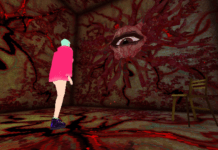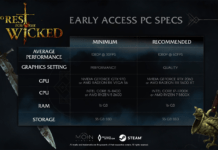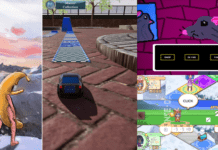Tanya DePass did not know that a tweet would eventually lead to a career based around making a difference for underrepresented people in games
One day in 2014, Tanya DePass was feeling the rage. She had been playing games for most of her life, since the time of Pong, ColecoVision, and the glory days of the arcade. And yet she still saw very few people like her in the games she played. A queer black woman, DePass started becoming aware of video games’ diversity problem as far back as 1987’s Street Fighter. Outside of sports and fighting, there were hardly any black characters around; queer characters were nearly nonexistent; and women characters made up a tiny percentage of gaming’s lead stars. That year at E3, game publisher Ubisoft had come out with a now infamous response to a journalist’s question about why all four of the playable characters in its latest Assassin’s Creed game were male: women were too much extra work to animate.
So she tweeted about it, using the hashtag #ineeddiversegames. And it exploded. People from within and outside the games industry started sharing their own reasons why they, too, needed better representation in video games: because they needed to see themselves; because they wanted their daughters to be able to play as a character they identified with; because they wanted to be able to create a character with natural hair. The hashtag eventually became its own Twitter account and website, and a not-for-profit organisation that works to give marginalised people a leg-up in the video games industry through initiatives such as Game Developers Conference scholarships, panels and events, and consultancy.
Before long, it was becoming a second job – so when she lost her day job, in higher education, Tanya decided she’d give it six months and see if she could make it work. It’s fair to say that she succeeded. Now 49, Tanya still runs I Need Diverse Games; she streams and plays Dungeons and Dragons on Twitch, going by CypherofTyr; in the summer of 2020 she raised nearly $200,000 for charity The Bail Project. She has spoken on diversity, feminism and intersectionality at video game events around the world; a short film, Game Changer, has been made about her life and work, and she is working on her own afrofuturist roleplaying game, Into the Mother Lands. Later this month she will receive the Gayming Icon award at the Gayming Awards in London, an LGBTQ+ video game awards show that’s now in its second year, for her efforts towards better representation in video games.
“It started with me literally just being mad about games,” laughs Tanya. “I never thought starting a hashtag in anger would lead to any of this!”
As a kid dropping quarters into arcade machines in Chicago, where she still lives, video games were an escape for Tanya, a treat for for herself. “My mother was really not about it – we grew up really poor, food-stamps poor, so I didn’t have a console of my own until I moved out of the house,” she says. “[But] games were another way to flex my imagination. I loved reading, and I treated it as an extension of being able to read and go to these different places – in games you can literally visit another world. I’m a very visual person, so while books are great and I can visualise them, with a controller in my hand I can see a world as the game is presenting it to me. It was an escape, it was relaxing, it was formative.”
But it didn’t escape Tanya’s notice that black and queer characters, when they did show up in games, were usually incidental. “Where are the people who look like me? They’re the hookers in a Grand Theft Auto game,” she says. ““As I got older I realised that there were people who actually didn’t want people like me in games. And if you do get a black character, if you get a gay character, they don’t live very long, or they’d be there for set-dressing – they’re not a full character. They’re not the people who get to save the world every single time.”
The games industry’s diversity has been steadily improving, especially in the past 15 years or so – the proportion of women, people of colour and LGBTQ+ people working in the industry has been rising. (For instance, in 2009, only 11.5% of respondents to the International Game Developers Association survey identified as female; now it’s closer to 30%). But there is more to do, especially when it comes to addressing the toxicity of some sections of video game fandom: last summer black streamers on Twitch were subjected to coordinated hate raids, where people would arrive in their thousands and spam a streamer’s chat with slurs and insults.
Tanya believes that the only way to change things is to have more non-white, non-male people involved at all levels of the games industry, but especially at the top. “It’s not good enough to have the representation in games themselves be better, but the people writing/making the games are no different,” she says. “People get exhausted coming to work and being the only person of colour, the only out queer person … often people want to speak up, but they also need their jobs, and it’s difficult.”
A lot of what they’re fighting comes down to access; it can easily cost $5,000 to attend the annual Game Developers Conference in San Francisco, for instance, a sum that is out of reach for many. This, she says, is why I Need Diverse Games exists: to offer advice and practical support to those people who might otherwise struggle to get a foot in the door, and to ensure the next generation of game developers is more diverse. And Tanya is motivated by the fact that, she wants younger players to have the representation that she didn’t.
“In the future I’d love to be able to have a game with a black protagonist, a queer protagnoist, and not have the gamer bros be mad about it,” she says. “Thinking back to when I was a teenager, it would have meant so much to have the games that we have now. If I’d had The Last of Us: Left Behind when I was 20 years younger, if I’d had a queer story like Life Is Strange, it could have helped me inform a lot of things … If anything that I do or the org does can help someone to get the representation that they need, then we’ve done a good job.”
Whether you’re a developer or a streamer, success in the video games industry is often measured in numbers: game sales, subscriber numbers, revenues. But for people who don’t fit the typical mould – people who are queer, black, gender non-conforming – simply existing, working and being visible in the games industry can make a significant impact. “I’ve had so many people say to me: seeing you do this makes me realise I have a place in the industry,” says Tanya. “Because there’s so many people who never see folks like us around. They don’t see us on stage at E3. Simply by being visible, it’s giving other people the idea that they have a place here, too.”
The Gayming Awards will take place on 25 April at the Troxy in London, and will be livestreamed on Twitch.











